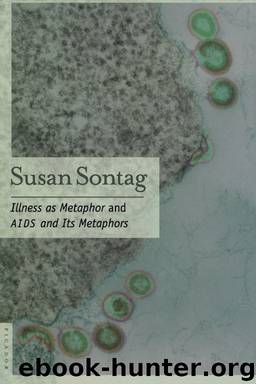Illness as Metaphor and AIDS and Its Metaphors by Susan Sontag

Author:Susan Sontag
Language: eng
Format: epub
Publisher: Farrar, Straus and Giroux
Published: 2016-02-23T16:00:00+00:00
3
Because of countless metaphoric flourishes that have made cancer synonymous with evil, having cancer has been experienced by many as shameful, therefore something to conceal, and also unjust, a betrayal by one’s body. Why me? the cancer patient exclaims bitterly. With AIDS, the shame is linked to an imputation of guilt; and the scandal is not at all obscure. Few wonder, Why me? Most people outside of sub-Saharan Africa who have AIDS know (or think they know) how they got it. It is not a mysterious affliction that seems to strike at random. Indeed, to get AIDS is precisely to be revealed, in the majority of cases so far, as a member of a certain “risk group,” a community of pariahs. The illness flushes out an identity that might have remained hidden from neighbors, job-mates, family, friends. It also confirms an identity and, among the risk group in the United States most severely affected in the beginning, homosexual men, has been a creator of community as well as an experience that isolates the ill and exposes them to harassment and persecution.
Getting cancer, too, is sometimes understood as the fault of someone who has indulged in “unsafe” behavior—the alcoholic with cancer of the esophagus, the smoker with lung cancer: punishment for living unhealthy lives. (In contrast to those obliged to perform unsafe occupations, like the worker in a petrochemical factory who gets bladder cancer.) More and more linkages are sought between primary organs or systems and specific practices that people are invited to repudiate, as in recent speculation associating colon cancer and breast cancer with diets rich in animal fats. But the unsafe habits associated with cancer, among other illnesses—even heart disease, hitherto little culpabilized, is now largely viewed as the price one pays for excesses of diet and “life-style”—are the result of a weakness of the will or a lack of prudence, or of addiction to legal (albeit very dangerous) chemicals. The unsafe behavior that produces AIDS is judged to be more than just weakness. It is indulgence, delinquency—addictions to chemicals that are illegal and to sex regarded as deviant.
The sexual transmission of this illness, considered by most people as a calamity one brings on oneself, is judged more harshly than other means—especially since AIDS is understood as a disease not only of sexual excess but of perversity. (I am thinking, of course, of the United States, where people are currently being told that heterosexual transmission is extremely rare, and unlikely—as if Africa did not exist.) An infectious disease whose principal means of transmission is sexual necessarily puts at greater risk those who are sexually more active—and is easy to view as a punishment for that activity. True of syphilis, this is even truer of AIDS, since not just promiscuity but a specific sexual “practice” regarded as unnatural is named as more endangering. Getting the disease through a sexual practice is thought to be more willful, therefore deserves more blame. Addicts who get the illness by sharing contaminated needles are seen as committing (or completing) a kind of inadvertent suicide.
Download
This site does not store any files on its server. We only index and link to content provided by other sites. Please contact the content providers to delete copyright contents if any and email us, we'll remove relevant links or contents immediately.
Periodization Training for Sports by Tudor Bompa(8274)
Why We Sleep: Unlocking the Power of Sleep and Dreams by Matthew Walker(6726)
Paper Towns by Green John(5191)
The Immortal Life of Henrietta Lacks by Rebecca Skloot(4589)
The Sports Rules Book by Human Kinetics(4388)
Dynamic Alignment Through Imagery by Eric Franklin(4217)
ACSM's Complete Guide to Fitness & Health by ACSM(4060)
Kaplan MCAT Organic Chemistry Review: Created for MCAT 2015 (Kaplan Test Prep) by Kaplan(4014)
Introduction to Kinesiology by Shirl J. Hoffman(3776)
Livewired by David Eagleman(3775)
The Death of the Heart by Elizabeth Bowen(3622)
The River of Consciousness by Oliver Sacks(3605)
Alchemy and Alchemists by C. J. S. Thompson(3522)
Bad Pharma by Ben Goldacre(3428)
Descartes' Error by Antonio Damasio(3279)
The Emperor of All Maladies: A Biography of Cancer by Siddhartha Mukherjee(3163)
The Gene: An Intimate History by Siddhartha Mukherjee(3099)
The Fate of Rome: Climate, Disease, and the End of an Empire (The Princeton History of the Ancient World) by Kyle Harper(3067)
Kaplan MCAT Behavioral Sciences Review: Created for MCAT 2015 (Kaplan Test Prep) by Kaplan(2987)
